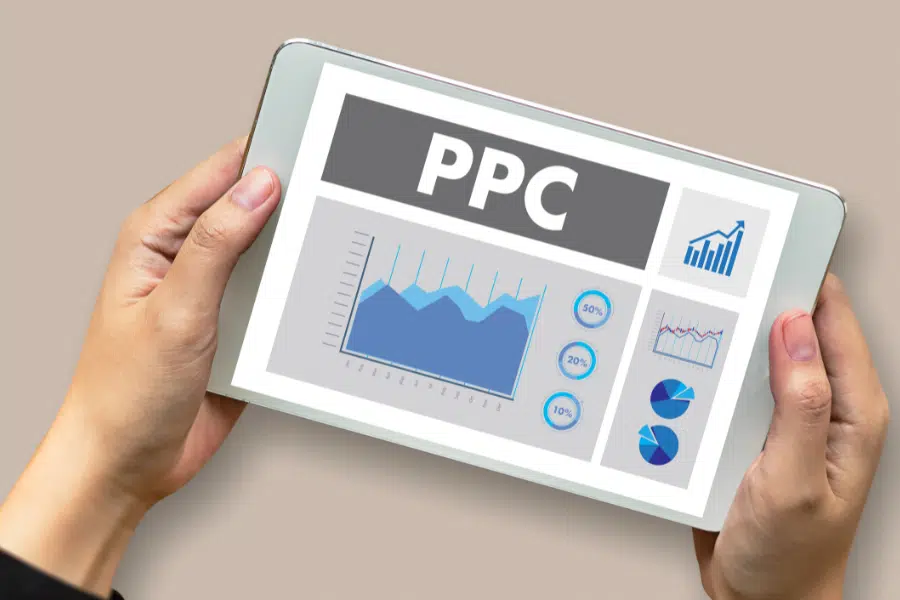
Is Paid Search Worth It for Medical Practice Marketing?
Navigating the competitive healthcare industry can be tough. With increasing competition, medical practices need powerful tactics to stand out in crowded digital spaces. Paid search for doctors (also known as healthcare PPC or medical paid search) can be a highly effective tool. It helps accelerate online presence and visibility, promote your healthcare business, and increase conversions. It’s a powerful way to get those already seeking medical information to be easily directed to your site. So, in the grand scheme, is paid search really worth it? In this blog post, we’ll explore the key benefits of paid search strategies, the factors that impact cost, and help you decide if this patient acquisition tool is the right fit for your practice. Let’s dive in!
The Key Benefits of PPC Ads for Doctors
Is paid search worth it in terms of benefits? Many medical practice brands fare better with a well-supported PPC campaign strategy. The key benefits include immediate traffic generation, precision audience targeting, and customized keyword selection for specific specialties. Such benefits stem from gaining access to high-visibility areas where patients actively search for answers online.
Is paid search for healthcare worth it in terms of benefits? Absolutely! Many medical practices see significant gains with well-crafted PPC campaigns. Here are some key advantages:
- Immediate Traffic Generation: Unlike organic search results from SEO, paid search for doctors can drive targeted traffic to your website quickly —this is an important edge for clinics needing a boost in patient acquisition.
- Precision Audience Targeting: PPC excels in reaching your ideal audience. The tools offered by ad platforms let you pinpoint location, demographics, interests, and even specific online behaviors. This focus streamlines your budget and improves lead quality.
- Customized Keyword Selection for Specific Specialties: Search experts and healthcare marketers know how to target those most likely to need your services. Whether you’re an urgent care center or a niche specialist, keyword optimization allows you to appear in searches relevant to your exact specialty.
Immediate Traffic Generation with Paid Search
PPC advertising can drive traffic to your website quickly, unlike organic search results (search engine optimization, or SEO), that can take months to bring in a steady flow of visitors. Conducive to generating leads, PPC offers a proactive solution for practices experiencing a slump in patient appointments, entering the market for the first time, or any clinics seeking to grow patient volumes through SEM strategies.
The Precision of Healthcare Audience Targeting in PPC
Precise audience targeting based on demographics, interests, and behaviors is ideal for local medical practices. Leveraging ad platform tools for more precision in targeting maximizes budget efficiency by reducing clicks from those outside your target audience and reaching those most likely to obtain your services.
Choosing the Best Google Search Keywords to Better Target for Your Specialty
You can better aim for the patients you want to reach by researching the best keyword opportunities. This promotes more efficient and cost-effective campaigns for your medical practice brand. For example, if your practice specializes in pediatric dentistry, keywords like “children’s dentist takes insurance” or “pediatric dental care near Apple Elementary School” are long-tail keywords to “filter” traffic to your website.
What is Keyword Bidding?
Space for sponsored ads is limited on Google’s search engine results page (SERP), and with everyone wanting to show up for the same keywords people search for – like your competitors – you “bid” for the desired PPC campaign keywords. Bids cap the amount an advertiser is willing to pay for each click. As advertisers only pay for each time a person clicks on a digital ad, that cost is set by the bid. Here are the initial and ongoing steps surrounding keywords and budget that establish and further optimize performance, targeting the right people at the right time:
- Set a budget – Know what your limit on keyword bidding is based on your overall budget so you do not spend more than you intended.
- Bid strategy – Decide which method of bidding is best for your needs: manual bidding, automated bidding, or a combination of both.
- Ad position goals – Determine if it is necessary for your Google Ads to consistently appear at the top of the page, or if a lower position will still do the job.
- Bid adjustments – Use settings to control audience reach including type of device, location, time of day, audience segments, etc.
- Monitor competitor bids – Keep an eye on competitor bids, but avoid bidding wars that inflate costs.
- Quality score optimization – Work toward a higher “quality score” to positively impact ad rank and reduce costs by creating highly relevant ad copy plus optimal alignment between keywords, ads, and landing pages.
- Ad schedule adjustments – Compare the performance of your ads at different times of the day or days of the week so that you can try adjusting bids based on peak performance periods.
- Regular performance review – Look at the performance of your keywords and adjust bids accordingly, and modify your keyword strategy based on data insights.
- Experiment with match types – Test out your match type options: broad match, phrase match, exact match to determine which is best for reaching your target audience.
- Budget allocation – Allocate more of the budget to those campaigns and keywords that perform the best and yield the best results.
Budget Considerations in Medical Paid Search Strategies
Rumors of PPC being expensive raise the question, “is paid search worth it?” But many medical practices find that they can meet business objectives on modest budgets. Bottom line: the cost of running campaigns is variable, depending on your market and competition.
So, for paid search to be worth the investment, it must more than recover the costs of campaigns through the revenue it generates. For this reason, many medical practices will use paid search ads to promote profit-generating services to offset the cost of digital marketing.
Managing Costs with Strategic PPC Planning To Improve ROI
Efficient cost management in PPC relies on strategic planning. Comprehensive keyword research, focused campaigns, conservative budget allocation, ad scheduling, and regular performance metric monitoring are all factors in managing costs.
Strategic planning aligns PPC efforts with business objectives, thereby maximizing ROI while maintaining cost control. Utilization of “negative keywords” and other optimizations made through testing and adjustments enhance efficiency and reduce expenditure.
Mastering PPC Performance Tracking and Analytics
Cost-effectiveness of your PPC campaigns will be confirmed through performance tracking and analytics. To validate your results, you set up reporting that covers multiple key performance indicators (KPIs).
What KPIs Advertisers Should Be Tracking
When setting up your PPC performance tracking, you will choose which KPIs to track. Common KPIs for PPC campaigns are:
- Ad position – Where the ad currently appears on the search engine results page.
- Impressions – Total number of times the ad is displayed, which is assumed to be how many Google users saw the ad.
- Ad clicks – The total number instances that a user clicks on your ad.
- Click-through rate (CTR) – Percentage of people who click on the ad.
- Cost per click (CPC) – How much it costs when the ad(s) are clicked on.
- Conversion rate – Percentage of users who take the desired action after clicking on the ad. For example, a patient completes and submits a new patient appointment request form.
- Cost per conversion (CPC) – The average cost for each conversion, meaning the ratio of clicks paid for to the number of times a desired action has been taken (new patient request form submission).
- Return on ad spend (ROAS) – Measures the revenue generated for every dollar spent on advertising.
- Quality score – Grading the quality and relevance of your ads, keywords, and landing pages.
- Search query performance – To compare search queries.
- Ad extensions performance – When using ad extensions, monitor if they are increasing engagement or not.
- Mobile performance – Tracks ad performance with mobile users.
- Ad copy performance – Evaluates the effectiveness of ad copy, which is part of A/B testing.
- Landing page quality – Evaluates the effectiveness of the landing page to ensure that it drives conversions.
- Geographic performance – Monitors performance in different geographic regions, which applies when campaigns are running in more than one area.
Common Pitfalls In Paid Search For Healthcare
Avoiding common pitfalls in PPC is a proactive way to prevent wasted ad spend and maximize the return on investment. Mistakes to avoid are:
- Overly Simple Keyword Research: Relying on overly broad or generic keywords without deep research into relevance and cost-effectiveness.
- Missing Negative Keywords: Not using negative keywords to filter out irrelevant search terms, leading to wasted clicks.
- Poorly Crafted Ad Copy: Weak or unpersuasive ad messaging that fails to capture attention and generate clicks.
- Neglecting Quality Score: Ignoring factors that impact Google’s Quality Score (keyword relevance, landing page experience, etc.), which can drive up costs and lower ad position.
- Poor Landing Page Quality: Having landing pages that are slow, confusing, or unconvincing, resulting in lost potential patients.
- Not Optimized for Mobile: Ads and landing pages that aren’t designed for mobile users, alienating a massive segment of your potential audience.
- Setting Unrealistic Goals: Having unrealistic expectations that can steer your PPC strategy off-course.
- Inconsistent Monitoring: Failing to regularly analyze and adjust your campaigns based on performance data.
- Forgetting the Competition: Not keeping an eye on your competitors’ activities and missing strategic opportunities.
- Ignoring Location Targeting: Wasting budget on clicks from outside your service area due to poor location targeting.
- Healthcare Ad Policy Non-Compliance: Running afoul of Google’s healthcare ads policy when it comes to ad content, data handling, and targeting. To learn more, we wrote a full article about Google’s healthcare ads policy here.
Summary: Is Paid Search For Doctors Worth It?
Because PPC is frequently recommended as a digital marketing investment for medical practices, one of the first questions that comes up is if paid search is worth it for potential customers. PPC carries a reputation for being expensive, but with guidance from experts, many medical practices can still cash in on the benefits (even on a smaller budget). Ultimately, the projected revenue generated from PPC campaigns should both cover the costs and contribute to your net gains, as well as grow your patient population.
Aside from line-item budget considerations, those who initiate paid search campaigns as a digital marketing strategy should be prepared to follow best practices and track results to make any adjustments needed to improve return on investment or pull the plug when it is sensible. For paid search to be worthwhile, it requires substantial planning and maintaining control so that marketing spend does not go to waste. Additionally, conducting a comprehensive audit of all the main advertising networks and platforms, such as Google and Microsoft Ads, as well as Facebook and Instagram, can help ensure that the message and keywords are consistent with your paid ads.
Is PPC Right for Your Medical Practice? iHealthSpot Has the Answer
When medical practice teams brainstorm ways to grow patient volumes, the topic of digital marketing almost always comes up, followed by an action plan to explore all the options. Paid search is one of many popular digital marketing methods, and while the benefits of PPC are undeniable, it does require more rigorous budget planning. Digital marketing experts at iHealthSpot can discuss how to get the most for your budget, how to get the most from PPC if you can afford it, and effective alternatives to PPC to grow your practice. Contact us today to get started.





